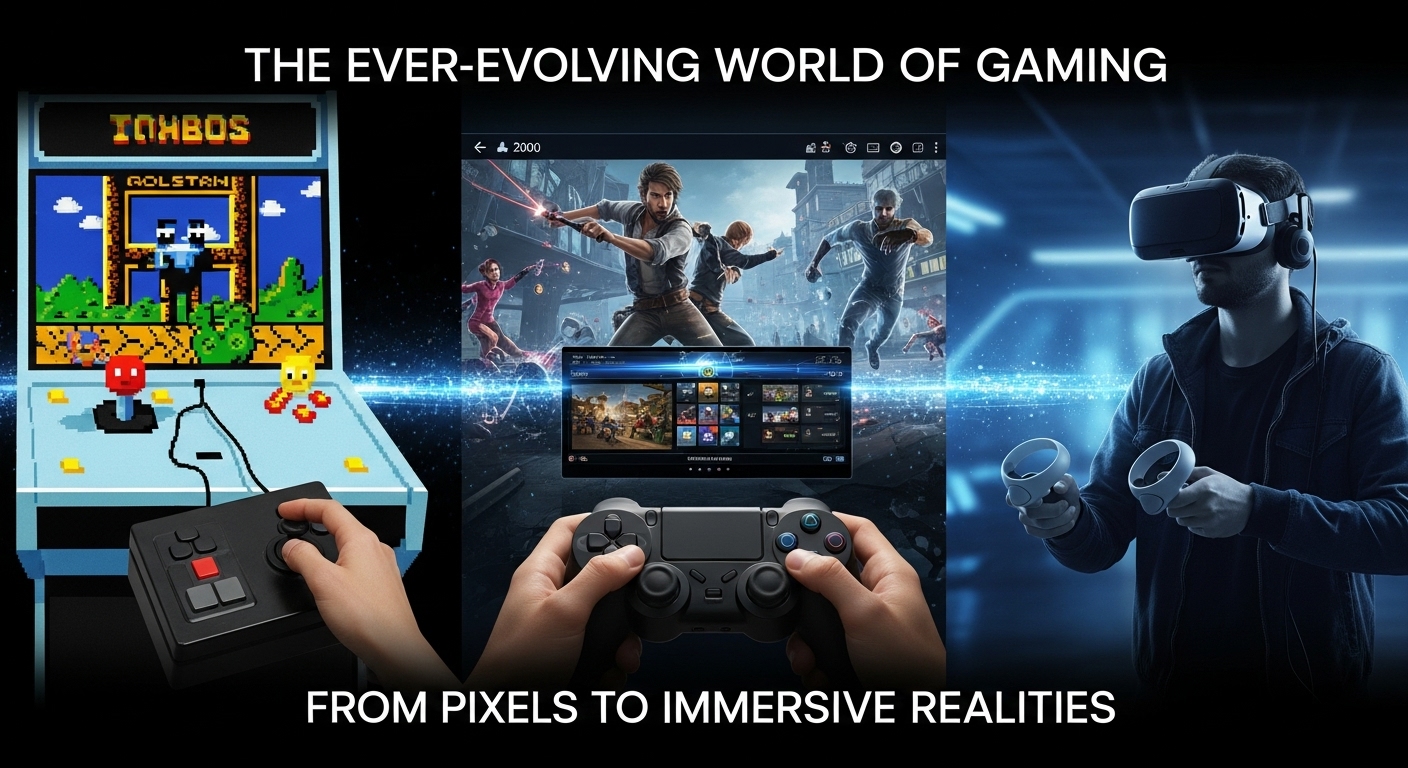Gaming has long been more than just a pastime; it is a cultural phenomenon, an art form, and for many, a way of life. From the earliest days of pixelated graphics to today’s hyper-realistic virtual worlds, the gaming industry has undergone a remarkable transformation, captivating millions around the globe. Whether you’re a casual gamer, a competitive esports enthusiast, or a developer fascinated by the intricacies of game design, gaming offers a unique blend of creativity, storytelling, and technology that is unmatched in any other medium.
The Origins of Gaming: A Historical Perspective
The roots of gaming stretch back to the early 20th century, long before consoles and PCs dominated living rooms. Early board games and mechanical games laid the groundwork for interactive entertainment. However, it was the advent of arcade machines and home consoles in the 1970s and 1980s that truly defined modern gaming. Classic titles such as Pong, Space Invaders, and Pac-Man were not just games; they were cultural icons that brought people together in arcades, creating a shared sense of excitement and competition.
The 1980s and 1990s saw the rise of home gaming consoles such as the Nintendo Entertainment System (NES) and Sega Genesis. These consoles transformed gaming from a social, public activity into a personal experience, allowing players to immerse themselves in digital worlds from the comfort of their own homes. Iconic franchises like Super Mario, The Legend of Zelda, and Sonic the Hedgehog became household names, shaping the collective imagination of a generation.
The Evolution of Technology in Gaming
Technological advancements have been the driving force behind the evolution of gaming. Early video games were limited by hardware constraints, resulting in simple graphics and rudimentary gameplay mechanics. As technology progressed, so did the complexity and depth of games. The transition from 8-bit to 16-bit systems allowed for more detailed graphics, richer soundtracks, and more sophisticated gameplay experiences.
The rise of 3D graphics in the mid-1990s marked a significant turning point. Games like Final Fantasy VII and Tomb Raider introduced immersive worlds and cinematic storytelling, elevating gaming to a form of interactive narrative art. With the launch of powerful consoles like the PlayStation 2, Xbox, and later the PlayStation 4 and Xbox One, developers gained the tools to create expansive open-world games, realistic physics engines, and advanced AI systems that added depth and unpredictability to gameplay.
The arrival of high-end PCs and advanced graphics cards further pushed the boundaries of realism. Modern games now feature photorealistic environments, lifelike character animations, and dynamic lighting effects that blur the line between the virtual and the real. Virtual reality (VR) and augmented reality (AR) technologies have added another layer of immersion, allowing players to step into fully interactive worlds in ways that were unimaginable just a decade ago.
Gaming Genres and Their Impact
One of the most fascinating aspects of gaming is its diversity. Different genres offer unique experiences, catering to a wide range of preferences and playstyles.
Action and Adventure
Action and adventure games are characterized by fast-paced gameplay, problem-solving, and exploration. Titles like Uncharted, God of War, and Assassin’s Creed combine compelling narratives with intense combat mechanics, keeping players engaged for hours. These games often feature intricate level design, hidden secrets, and environmental storytelling that enriches the overall experience.
Role-Playing Games (RPGs)
Role-playing games immerse players in expansive worlds where choices matter. From classic RPGs like Final Fantasy and Dragon Quest to modern hits like The Witcher 3: Wild Hunt and Cyberpunk 2077, these games emphasize character development, strategic combat, and branching storylines. The sense of agency and investment in these worlds creates an unparalleled level of engagement, making players feel like they are living the story themselves.
First-Person Shooters (FPS)
First-person shooters, or FPS games, place players directly in the action, offering fast-paced, tactical gameplay. Titles like Call of Duty, Halo, and Counter-Strike have defined competitive gaming for decades. FPS games require precision, strategy, and quick reflexes, making them popular in both casual play and esports competitions.
Strategy and Simulation
Strategy and simulation games challenge players to think critically and plan ahead. Games like Civilization, SimCity, and StarCraft emphasize resource management, tactical decision-making, and long-term strategy. These genres appeal to players who enjoy cerebral challenges and complex problem-solving.
Multiplayer Online Battle Arenas (MOBAs) and Esports
The rise of competitive gaming has been fueled by MOBAs like League of Legends and Dota 2. These games require teamwork, strategic planning, and split-second decision-making. Esports has turned gaming into a professional sport, with tournaments drawing millions of viewers and offering multi-million-dollar prize pools. The professionalization of gaming has created opportunities for players, coaches, and analysts, solidifying gaming as a legitimate career path.
The Psychology of Gaming
Gaming is more than just entertainment; it has significant psychological and social implications. Studies have shown that gaming can improve cognitive skills such as problem-solving, spatial awareness, and multitasking. Games often require players to learn and adapt quickly, enhancing critical thinking and decision-making abilities.
Moreover, gaming fosters social connections. Multiplayer games and online communities allow players to form friendships, collaborate on challenges, and compete in a shared virtual space. For many, these connections are as meaningful as those in the physical world. The sense of achievement and progression in games can also boost self-esteem and motivation, providing a sense of purpose and accomplishment.
However, it’s important to recognize potential downsides. Excessive gaming can lead to addiction, social isolation, and physical health issues if not balanced with other activities. Like any form of entertainment, moderation and mindful engagement are key to enjoying gaming responsibly.
The Art of Game Design
Behind every successful game lies a team of dedicated designers, artists, and programmers who bring virtual worlds to life. Game design is a complex blend of art, storytelling, and technology. Designers must consider gameplay mechanics, narrative structure, level design, and player experience simultaneously.
Storytelling is a cornerstone of modern game design. A well-crafted narrative can transform a simple game into an emotional journey, creating memorable experiences that linger long after the player has stopped playing. Visual design and soundtracks also play a crucial role, shaping the atmosphere and emotional impact of the game. From realistic character models to haunting musical scores, every element contributes to the player’s immersion and enjoyment.
The Business of Gaming
The gaming industry has grown into a multi-billion-dollar global enterprise, rivaling the film and music industries in size and influence. Revenue streams are diverse, including game sales, downloadable content, subscriptions, in-game purchases, and esports sponsorships.
Mobile gaming has become a particularly lucrative sector, reaching millions of casual players worldwide. Free-to-play models, supported by in-game microtransactions, have revolutionized the industry, making gaming more accessible while generating significant revenue for developers.
The industry’s rapid growth has also led to greater professionalization and competition. Studios invest heavily in marketing, research, and development to create blockbuster titles that appeal to global audiences. Independent developers, meanwhile, continue to innovate, producing unique games that challenge conventional norms and push creative boundaries.
Gaming and Culture
Gaming has become deeply embedded in modern culture, influencing art, music, fashion, and storytelling. Iconic characters and franchises have transcended their digital origins, appearing in movies, television shows, merchandise, and fan art. Cosplay, fan fiction, and streaming culture demonstrate the profound connection between players and the games they love.
Streaming platforms and content creators have transformed gaming into a spectator sport. Millions of viewers tune in to watch others play, commentate, and compete, creating vibrant communities that celebrate gaming as a shared experience. Gaming conventions and events bring fans together, fostering a sense of belonging and shared passion.
The Future of Gaming
The future of gaming promises even more innovation and immersion. Advances in AI, cloud computing, and virtual reality will continue to shape the industry, enabling games that are more responsive, dynamic, and lifelike. Procedurally generated worlds, adaptive narratives, and intelligent NPCs could redefine what it means to interact with virtual environments.
Cross-platform play, cloud gaming, and subscription services are making games more accessible than ever, allowing players to experience high-quality games on a wide range of devices without the need for expensive hardware. As technology evolves, the boundaries between gaming, social interaction, and entertainment will continue to blur, creating experiences that are more immersive, engaging, and socially connected.
Moreover, the growing recognition of gaming as a legitimate art form and professional pursuit suggests that the cultural impact of gaming will only deepen. With increasing academic study, artistic exploration, and professionalization, gaming is poised to remain a central part of global culture for decades to come.
Conclusion
Gaming is more than just a hobby; it is a dynamic, multifaceted phenomenon that continues to evolve at an astonishing pace. From its humble beginnings in arcades to today’s sprawling digital worlds, gaming combines storytelling, technology, and human creativity in ways that few other forms of entertainment can match.
Whether you are drawn to the thrill of competitive esports, the emotional depth of narrative-driven games, or the intellectual challenge of strategy and simulation, gaming offers something for everyone. Its cultural, psychological, and technological impact is profound, shaping how we connect, create, and experience the world around us.
As we look to the future, one thing is certain: gaming will continue to evolve, surprise, and inspire, captivating generations of players and leaving an indelible mark on our collective imagination. In the ever-expanding universe of gaming, the possibilities are limitless, and the adventure has only just begun.



